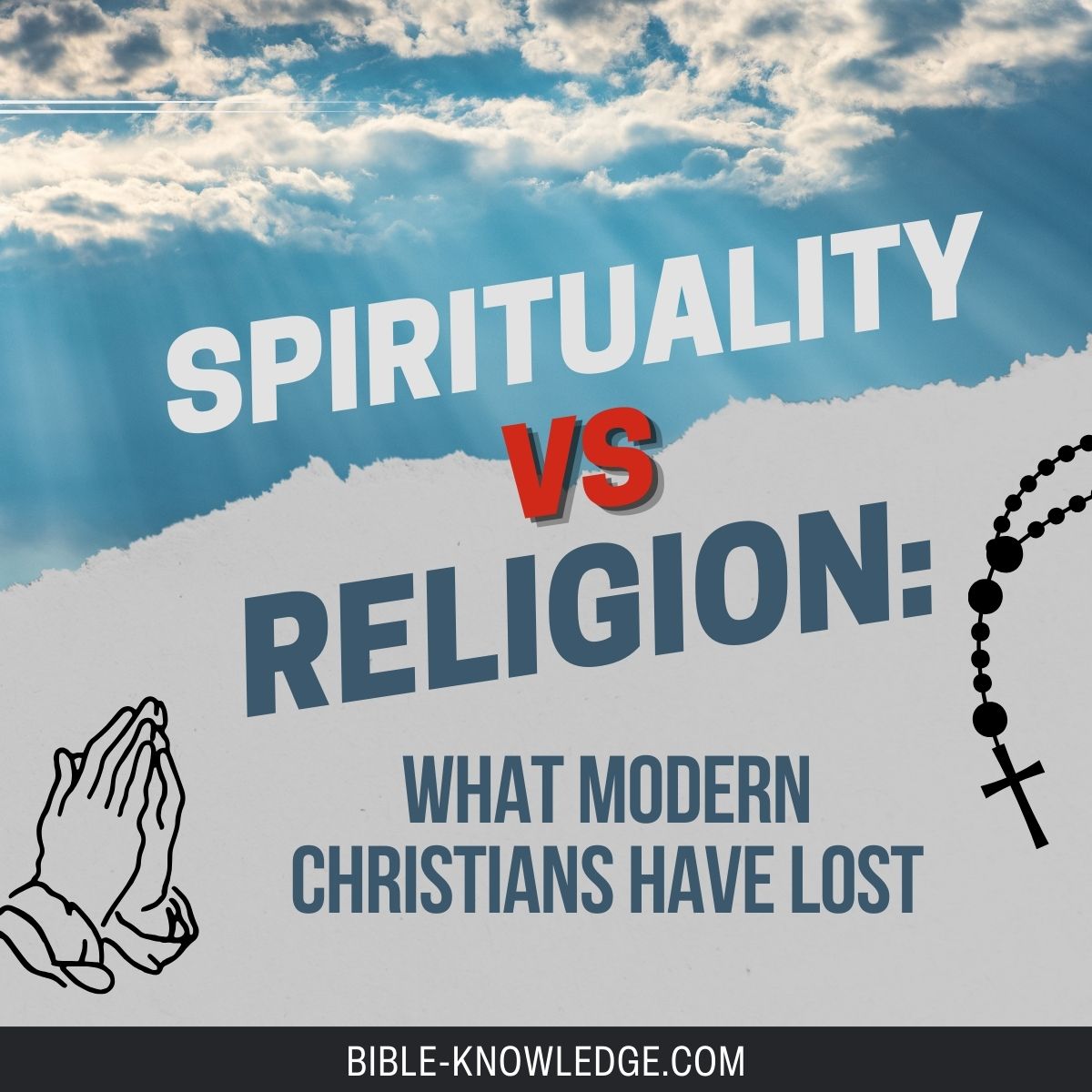Meditation, mindfulness, transcendence. Words like these and others are often an immediate turn-off for most traditional Christians. In fact, in modern American churches, especially those that take a more conservative view, there is little room for much exploration of true spirituality.
It is understandable, though, when you consider how over the years, as the New Age Movement made itself more prevalent in everyday life, conservative Christians have felt the need to make a distinct division between themselves and spirituality.
However, in this effort to make a distinction, Christians have also alienated themselves from spiritual practices that the Word of God actually encourages.

What’s Everyone So Scared Of?
The Christian turn-off over all things “spiritual” began to take place in the 1970s and 80s as the New Age Movement began to grow in popularity in America. The publication of David Spangler’s book “Revelation: Birth of A New Age” in 1976 brought on a revival of occult practices in America. Among those practices were Tarot card reading, astrology, mediumship, magic and more.
The problem was that these blatantly sinful practices were labeled as spiritual practices and were touted as a means to achieve spiritual transcendence. Furthermore, these and other occult practices were subtlety mixed with authentic spiritual practices such as mediation, self-denial, mindfulness, spiritual elevation through physical purity and diet, as well as others.
The result was that by the late 1980s, Christians had grown wary of the term “spiritual” or “spirituality” altogether. It has apparently been much easier to simply throw out the baby with the bath water rather than take the time to find out what the Word of God says.
The Great Need
As the New Age Movement took hold in the 1970s and 80s, it was met with an equally powerful conservative movement among Christians. It was during this time period that the Independent Baptist Movement began to grow, and some of the most iconic IFB mega-churches hit their heyday.
First Baptist of Hammond, Indiana, Highland Park Baptist in Chattanooga, TN, and the Calvary Baptist franchise, just to name a few. The IFB movement was defined by a staunch stand against the New Age Movement, secular music, worldly/trendy clothing, new versions of the Bible and in most cases public education.
Although the IFB movement has lost its steam in the last 10-15 years, the stigma associated with true spiritual practices has held on. As a result, the word “spiritual” or “spirituality” became synonymous with rule-following for many conservative Christians.
Rule-following is a close cousin of spirituality, and we call it religion. Humans have a God-given longing to cling to something bigger than themselves. This need is for Jesus. This need is for a Savior to worship. However, the relationship with that Savior is a spiritual relationship.
When you attach stigma to spirituality, then you will be tempted to cling to something else. The disaster of most modern churches is that rule-following has become our religion and true Biblical spirituality has been labeled something to be wary of.
Biblical Spirituality
Romans 8:6 says, “For to be carnally minded is death; but to be spiritually minded is life and peace.” Being spiritual is a desired state of being for a Christian. Webster’s 1828 dictionary defines spirituality as, “Spiritual exercises and holy affections.” So where are we supposed to learn these “spiritual exercises and holy affections” from? Obviously not from the New Age Movement.
John 14:26 tells us. “But the Comforter, which is the Holy Ghost, whom the Father will send in my name, he shall teach you all things, and bring all things to your remembrance, whatsoever I have said unto you.”
The KJV uses the terms “Holy Ghost” and “Holy Spirit” interchangeably. So, we are supposed to be spiritually minded, or spiritual, and God promised to give us a gift of the Holy Spirit to be a guide for us. The Holy Spirit would teach us all things, bring all things to our remembrance and act as a comforter. Biblical spirituality, then, is not a checklist of rules but rather an ongoing interaction with the Holy Spirit. He teaches, we learn. He leads, we follow. He comforts, we rest.
Christians miss out on so much of what was intended for them when they belittle the Holy Spirit. How do we belittle the Holy Spirit? There are many ways. One way is to limit the Holy Spirit. We can limit the Holy Spirit by erroneously believing that only certain people, such as pastors, experience its leading.
The Word of God never limited the Holy Spirit in this way. Whenever it is spoken of in the Bible it is spoken of as a gift for all Christians. We can also belittle the Holy Spirit by taking spiritual practices and giving them over to the world. This is what has happened with the New Age Movement.
Our Stolen Spirituality
The New Age Movement has successfully scared Christians away from vital spiritual practices by simply controlling the meaning of certain words. Words that have Biblical roots have been twisted and distorted to the point that, when uttered today, Christians immediately shy away.
The result is that true Biblical spirituality has, in essence, been stolen from the church. We have replaced our stolen spirituality with checklists of rules, which we dutifully mark off each day, hoping that it’s enough.
This does not need to be the case, however. The first step in reclaiming true Biblical spirituality is to understand how Biblical spiritual practices have been distorted by the New Age Movement. It is also important to understand the Biblical root of the practice. Let’s look at a few spiritual practices that have been distorted this way.
Meditation
Through misuse, this word has taken on a meaning that almost always carries connotations of Eastern religion and mysticism. The word meditate or meditation is used 23 times in the Bible. Webster’s 1828 dictionary defines meditation as “Close or continued thought; the turning or revolving of a subject in the mind; serious contemplation.”
Using its true definition, meditation can be applied to almost any subject matter. You can meditate on solving a problem, meditate on formulating a plan, or any number of things. Meditation in and of itself is not a sin. It is simply a way of thinking about something. Eastern religions and the New Age Movement, however, have laden this Biblical word with meaning which is not Biblical.
The uses of meditation in Eastern religion lend itself to achieving inner peace or finding spiritual guidance in the absence of a relationship with Jesus Christ. That form of mediation basically elevates man to the position of the Holy Spirit. The idea being that if I just focus hard enough, meditate long enough on my intention and then I can achieve a spiritual state of peace and even morality without God. This is a sin.
The way meditation is used in the Bible, most notably by the Psalmist David, is in meditation on God. Psalms 104:34 says, “My meditation of him shall be sweet: I will be glad in the LORD.” Over and over, David declares that he will meditate on the Lord. So, applied Biblically, meditation is the “close or continued thought, the turning or revolving of a subject in the mind, serious contemplation,” of God, His Word and most importantly, His will.
The Holy Spirit was given to us to be our teacher, comforter and guide. This can only be accomplished when we give the Holy Spirit the necessary, quiet moments to teach, lead and comfort. These quiet moments are meditation. Spending this time in meditation is the only way to achieve true Christian spirituality.
Many Christians make a distinct difference between mediation and prayer. However, for some, these two practices are one and the same. How one meditates is not so much the issue as the importance of consistently doing it. Christian meditation/prayer is best practiced alone during the quietest, least active part of your day. Consistency is very important.
Karma
I use this term only because it is the term that is easily recognizable today. As it is used today, karma, is the word used for the spiritual belief held by Hindu or Buddhist religions of spiritual cause and effect. This idea, like many Hindu or Buddhist ideas, was adopted into many New Age beliefs.
This spiritual principle, however, is a Biblical principle. Galatians 6: 7-10 tells us:
“Be not deceived; God is not mocked: for whatsoever a man soweth, that shall he also reap. For he that soweth to his flesh shall of the flesh reap corruption; but he that soweth to the Spirit shall of the Spirit reap life everlasting. And let us not be weary in well doing: for in due season we shall reap, if we faint not. As we have therefore opportunity, let us do good unto all men, especially unto them who are of the household of faith.”
Galatians 6: 7-10
Literally translated from Hindi, the word simply means “action.” However, even this sound Biblical principle causes Christians to recoil. The reason for this is, again, because the spiritual idea has been stolen from Christianity and given worrisome connotations. This spiritual principle, which is originally a Christian principle, should be a foundational spiritual practice and belief.
Our actions (what we sow) will determine our results (what we reap). If Christians would adopt the sowing and reaping principle, you don’t have to call it karma, you will discover a deeper connection to the Holy Spirit and a more satisfying Christian life.
Taking responsibility for your actions and understanding that your actions create many of the results in your life is very empowering and humbling. This spiritual practice will help you make better choices and lead you more quickly to repentance when you have made the wrong choices.
Holism
Holism is the belief that the whole of any complex thing is greater than the sum of its parts. Holistic ideas are often referred to in health and medicine today, but even in this innocent realm some conservative Christians feel wary. Holism, as with the other ideas we have looked at, is also a Biblical principle. 1 Thessalonians 5:23, we read:
“And the very God of peace sanctify you wholly; and I pray God your whole spirit and soul and body be preserved blameless unto the coming of our Lord Jesus Christ.”
1 Thessalonians 5:23
God sees us as a whole being. New Age Religion did not invent the idea of holism. God did. Therefore, we do not need to be scared of this idea. Holism, as far as health is concerned, can be seen in verses such as:
- Proverbs 17:22: A merry heart doeth good like a medicine: but a broken spirit drieth the bones.
- Proverbs 3:7-8: Be not wise in thine own eyes: fear the Lord, and depart from evil. It shall be health to thy navel, and marrow to thy bones.
Both of these verses imply a connection between our minds, bodies and spirits. Holism is simply that a connection between mind, body and spirit and it is a Biblical, spiritual principle. Embracing holism, whether you call it that or not, can help you deepen your connection to God and improve your health so that you can be of better service in God’s kingdom.
Transcendence
This is probably one of the most misused terms in New Age spirituality. Today, this word can be used when speaking about something as innocent as meditation to something as Satanic as seances and witchcraft. Again, this perfectly illustrates how understandable it is that Christians are wary of these terms and even more wary of their practice.
This is just another example, though, of a good spiritual practice taught in our Bible which has been stolen and distorted by New Age practices and abandoned by conservative Christians.
The actual definition of transcendence simply means “experience beyond the normal level or physical level.” Here is an innocent example of actual transcendence in everyday life. A patient is about to be wheeled into the OR for a serious surgery.
They are terrified, on the verge of tears, hearts pounding. This is a normal level of reaction to something fearful. A loved one takes their hands and begins to pray with them. During the prayer, the patient is overcome with a sense of calm and peace. Their heart stops pounding, the tears dry up. At the end of the prayer, the patient opens their eyes, filled with courage and hope that the surgery will go fine.
Through prayer, the patient was able to transcend their normal experience and attain a different spiritual level of experience. This is all transcendence means. To rise up above the normal, physical experience and operate in a spiritual experience instead.
Someone is rude to you in a store. They smash their buggy into yours with a rude, “Excuse you!” The normal experience is to react in anger and have your entire day put off track by the actions of a complete stranger. Through Biblical transcendence, though, you can stop, breathe, connect with the Holy Spirit, be led by wisdom, bless this person in your heart and leave the incident there in the aisle of the store.
Although the word transcendence is not used in the Bible, the principle is clearly seen in verses such as:
- Romans 12:2 And be not conformed to this world: but be ye transformed by the renewing of your mind, that ye may prove what is that good, and acceptable, and perfect, will of God.
- Isaiah 40:31 But they that wait upon the Lord shall renew their strength; they shall mount up with wings as eagles; they shall run, and not be weary; and they shall walk, and not faint.
Because of its prevalent connotations with New Age spirituality and Eastern religions, many Christians will likely never choose to use the word transcendence when discussing this spiritual exercise, but that does not belittle its value. Words such as renewal, transformation, and elevation can hold the same meaning. Again, the point is that Christians reclaim these spiritual practices, even if they do not choose to use the same terminology.
How to Tell the Difference
It is important that there be an obvious distinction between the things of God and the things of the world. Even if the world has taken these terms and practices and distorted them, it is still our responsibility to make sure we know where the line is drawn. There are a few ways you can help yourself differentiate between New Age practices and true Biblical spirituality. True Biblical spirituality is never:
- Self-centered
- Judgmental
- In contradiction to the Word of God
- Deceitful
New Age practices are often very self-centered, even to the point of elevating self to the position of a god. New Age practitioners are also often very judgemental of other religions even though they tout religious tolerance as an important tenant of their belief system.
This is often not the case. Many of the practices of New Age spirituality are in direct contradiction to the Word of God. New Age practices are also often a deceitful means for justifying sin without feeling guilt or conviction.
Conclusion
Understanding how spiritual practices have been stolen and distorted from the Christian faith is an important starting point for reclaiming our own spirituality. A smart Christian will study these things to learn the true history and Biblical roots of such practices and prayerfully consider how God wants these practices incorporated into our everyday Christian lives the right way.
A New Age practitioner may practice Holism, believe in Karma, or mediate. Christians should understand, however, that these individuals are doing so from the wrong perspective or they are doing so with the wrong intention.
The perspective, the motivation and the intention are key. A woman may put on a pretty dress with the intention of going out to commit adultery with someone she isn’t married to. Does that make putting on any dresses for anyone a sin? Obviously not.
The same logic applies with spiritual practices today. Engaging in Biblically rooted spiritual practices, which have the intention of deepening your relationship with the Holy Spirit, is not a sin. The New Age Movement may have taken these things and applied wrong intentions to them, but that does not mean Christians cannot reclaim them in order to deepen our Godly, spiritual experiences.





Thank you for this insightful article. Immensely helpful.
Thank you so much.
I really like your articles, how you bring back authentic Christian beliefs and standards in this confused generation. Thank you for always being a light for me. God bless this ministry.
@Landry, For starters, we true believers in the faith of Jesus and the Holy Spirit speak in tongues. New age churches won’t even put it out there but keep it to a few select people. Also, Jesus gives every true believer the power to heal and cast out demons. There not teaching these gifts and abilities any more. We are in the final church age, Church age of Laodicea . Read it and it will show you the bigger picture. I am a new believer at 65 and have been shocked to see what I read as not being taught in the church. There are still some Holy Spirit filled people in these churches that are working together to promote the truth about the gifts of the Holy Spirit. And hopefully a revival
Again, thank you. I have forwarded this article to a friend of mine. She had posted how, most of what you talked about, is a sin. Our Pastor has been teaching on these things. We are in a Bible study on “The Victorius Life”. I love your program. you hit the mark everytime. Thank you and God bless.